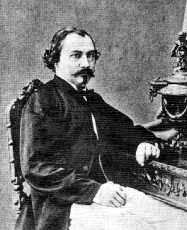Mathieu-André Reichert

(1830 – 1880)
Virtuoso flutist Mathieu-André Reichert was also a composer, influenced by and an influence to Brazilian music. The impeccable flute technique of Reichert's in contact with the Brazilian ginga of Joaquim Antônio da Silva Callado Jr. is assumed to be the origin of the Brazilian flute lineage.
The son of nomadic musicians, Reichert began to play in cafés early in his childhood, soon becoming a professional. Taken by professor Jules Demeur and François-Joseph Fétis to the Brussels Conservatory, he had such a fulgurant performance there. At 17, he won the Conservatory's first prize and was hired as musician of the Belgium court. At the same time, he became an international concerto flutist, playing in Europe and the United States. In 1859, Brazil's Emperor D. Pedro II hired a group of European virtuosi to play at the palace. On June 8, 1859, Dutch violinists André and Ludwig Gravestein, Italian trompa player Cavalli, Italian clarinetist Cavallini, and Reichert arrived in Rio. The first performance was at the Teatro Lírico Fluminense, and Reichert became the first flute of the Teatro Provisório. On July 3 of the same year, he opened in the position of soloist and performed throughout São Paulo, Rio Grande do Sul, Pernambuco, Bahia, and Pará and had a great number of noted disciples, among them Manoel Marcelino Vale and Duque Estrada Meyer.
In Rio, he became friends with Joaquim Antônio da Silva Callado Jr., the great Brazilian flutist of those times. But he inadvertently provoked the animosity of the fans of Callado, who pretended to create a rivalry between them that never existed.
Reichert produced more interest around the instrument throughout Rio. Not only was he a splendid player and composer, but he was one of the introducers of the modern Boëhm system of the modern transverse flute, opening new possibilities for the instrument. The system, created by the German Theobald Boëhm, suffered strong opposition by the supporters of the old wooden flute with a variable number of keys.
By and by, Reichert became interested and, finally, passionate by the music of the Carioca chorões (choro players). His several compositions, especially his polka "La Coquette," are evidences of the assimilation of the Brazilian way of playing. This polka was taken into the choro repertory of those times under the title of "As Faceiras," being played, according to Batista Siqueira, by all music bands of Rio de Janeiro.
Reichert ended his days in complete poverty, dying of cerebral convulsion caused by meningoencephalitis, eight days before Callado (who died in the same epidemic, which was ravaging Rio at the time). Reichert was buried at the Cemitério de São João Batista, Rio.